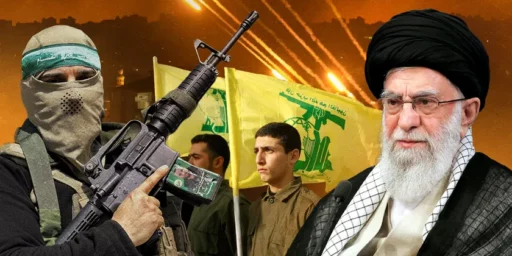Israel Begins Historic Gaza Withdrawal
The Israeli army set up barriers today to keep their own citizens out of the Gaza Strip, land they won a generation ago in a war started by the Palestinians Arabs and on which they have lived for nearly forty years.
Israel Begins Historic Gaza Withdrawal (AP)
Israel lowered a road barrier sealing the Gaza Strip to Israeli civilians at midnight Sunday — signaling the start of a historic withdrawal that will end its 38-year occupation, redraw borders and reshape prospects for Mideast peace. But several hundred settlers vowed stay in their homes and ignore orders to leave Gaza within 48 hours. They were reinforced by up to 5,000 hard-line activists from outside Gaza who planned to block forceful evictions.
Trouble surfaced shortly after the ceremony when hundreds of protesters from the largest settlement, Neve Dekalim, blocked the main road, stopping army vehicles and scuffling with soldiers.
At the border, soldiers lowered a red road barrier at the Kissufim Crossing between Israel and Gaza, with a sign on the barrier reading: “Stop, entry into the Gaza Strip and presence there is prohibited by law.” With about 200 people looking on, the barrier was raised and lowered several times, apparently because of technical problems. Soldiers secured it with a wire to keep it shut.
Two large Israeli flags waved beside the barrier. As it went down, a traffic light changed from green to red and three vans carrying settlers and their belongings drove out of Gaza, never to return. “The Gaza Strip has been closed today based on the decision of the Israeli government and today another phase begins,” said Brig. Gen. Guy Tsur, a senior commander.
The withdrawal, marking the first time Israel gives up settled land claimed by the Palestinians for their future state, comes after months of political wrangling and mass protests. On Sunday, Israeli troops took up positions to launch the evacuation and Palestinian security forces fanned out to prevent militant attacks.
Israel’s army chief appealed to troops to show restraint in removing thousands of Jewish settlers from their homes amid concerns that resistance could turn violent after thousands of anti-pullout activists slipped into the territory.
The presence of a few thousand Israelis in Gaza, among 1.3 million Palestinians, has become a security burden, said Vice Premier Ehud Olmert. “The state of Israel does not want to be in the Gaza Strip and does not need to be in the Gaza Strip,” he told Israel TV’s Channel One.
In the hours leading up to the closure, thousands of Palestinian police moved into positions near Jewish settlements with orders to keep away Palestinian crowds and to prevent attacks by militants during the pullout — something that Israel warned would bring harsh retaliation.
Officers planted Palestinian flags and pitched tents while some chanted in praise of their late leader, Yasser Arafat. Hundreds of supporters of the militant Islamic Jihad group celebrated in Gaza City, with gunmen firing in the air, and teens setting off fire crackers and distributing sweets. The violent Hamas group organized special midnight prayers of thanks at Gaza mosques.
Palestinian residents watched settlers packing up. “They are actually leaving. Who would have ever thought?” said Palestinian farmer Ziyad Satari, 40, standing on the roof of his three-story home in the Palestinian town of Khan Younis, which overlooks the Morag settlement. Many Palestinians have expressed doubt that the withdrawal will take place.
Palestinian Authority leader Mahmoud Abbas offered the Israelis reassurance. “We tell the Israeli people, `You have chosen the right path,'” he told Israel TV’s Channel 10. “This is the right path. Don’t listen to the voices of the extremists who want a continuation of the occupation. I don’t want — and I will not accept — any clashes with the army or the settlers.”
Giving up these settlements is a necessary first step to peace, if such is even possible in this longstanding struggle. Not only do the Palestinians need land to have a state but they need to demonstrate their ability to control the terrorist and other extremists if they are to gain the trust of the Israelis.
Correction: Megan McCardle and Jim Henley both note, rightly, that the Palestinians did not start the 1967 War. Indeed, it was started by an Egypt-Jordanian-Syrian alliance–although the Israelis did strike first. I knew that–really I did. Nonetheless, the land was seized by the Israelis as a protective measure and not from the Palestinians in any case but from Egypt.






Israel is a democratic country. Why can’t the Arabs stop bombing busses and then they’ll be able to vote out the Jews.
Melvin, hmmm…maybe its because the Arab Israelis themselves don’t enjoy the “benefits” their Jewish counterparts do in Israel?
http://israeli.menj.org/?p=207
Best regards.
The PALESTINIANS started the 1967 war? James, that’s just stupid. Did Stotch get hold of your account somehow?
Last time I looked, the war was started by Egypt. All Arabs aren’t the same, any more than you can lump Dutch, Germans and Swedes into one people.